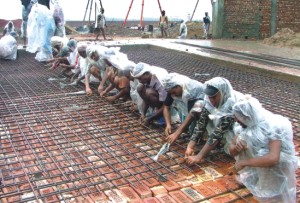| Impressions
Another Death, Unavenged
Nusrat Jahan Pritom
Recently some newspapers and magazines put forward a terrible story of a worker killed because he had dared to ask for his wages. The name of the worker was Saifuddin. The incident took place on July 12 in Khilgaon, Dhaka.
Saifuddin was just a seventh grader, a boy of 16 years and he had only demanded what he had rightfully earned. According to the Children Act, any under the age of 16 is termed as a child. Also CRC (United Nations Convention on the Right of Children) defines a child as a "human being below the age of 18 years." So nationally, as well as internationally, it is clear that Saifuddin was just a kid. However a kid is no kid in a developing country such as this one. Not only Saifuddin but all working children and street children are taken to be half-adults who are on the fringes of society. As stonecutters, servants, helpers, tokais etc. these kids have stepped out not by choice but because they are under their own steam. Yet they are scoffed, scolded, beaten and sometimes, even killed! A life of poverty is no life at all, but a vague irreparable condition. Those who step out to earn their bread manage only a meagre meal after hours of hard work. Their socio-economic standards, their reputation, their wages-nothing increases. The lessons are cruel and painful for any grown-up underprivileged person to acquiesce to. But it is especially hard for a youngster to comprehend.
In spite of the difficulties, many poor, hapless kids still opt for such lessons and adjust themselves to their new tough lives. Most people regard them (to be) dirty, illiterate and ill-mannered-which obviously they are because they are given nothing but contempt and scoffs.
Nuruzzaman, the murderer, had come from the same background. But instead of his heart being moulded into sympathizing for the boy, his mind rather degenerated into killing him for a simple quarrel. As Saifuddin was under his care for an appointed time of the day, doesn't that make Nuruzzaman his guardian in a way? Then what and how could their relationship be equivalent to if he could just kill him so brutally? It makes no sense when you think about it. But money is such a factor which has no boundaries in terms of greed in their twisted minds and they go off to any limits in their misdeeds.
Leaving aside the criminal's character, it is really Saifuddin's character which should be highlighted and appreciated. The reason why he truly deserves to be remembered and appreciated is that despite the poverty that surrounded him and forced him to work for a living, he was determined to continue his education. What could he have got in his lifetime by persevering in his studies is something we will never know.
It is also people's reaction to the untimely death of a child that is disturbing. The crime was unforgivable, the victim unfortunate, yet it has already become one of those everyday stories of rape and murder that one comes across in a column in the dailies. Who cares if a poor boy gets murdered for a trivial reason? After all, his life is seen as worthless anyway, everyday such people die in accidents or mishaps.
But Saifuddin's life was not valueless, it was priceless. Do you know why it was priceless? It's because nobody was around to pay the price. And nobody ever will.
Copyright (R) thedailystar.net 2008 |
